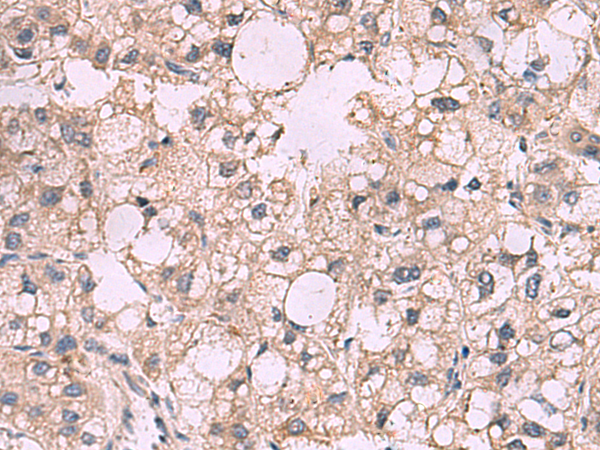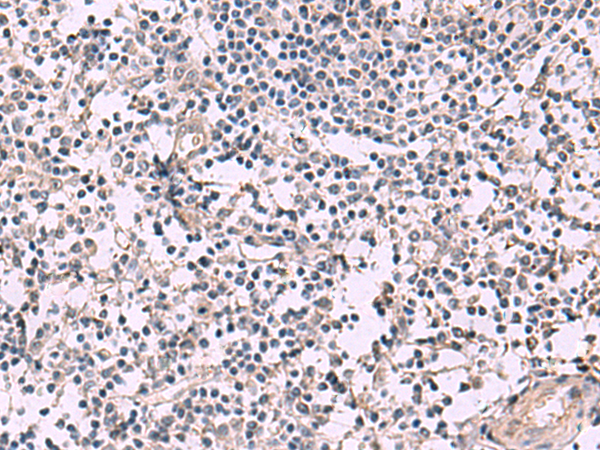

| WB | 咨询技术 | Human,Mouse,Rat |
| IF | 咨询技术 | Human,Mouse,Rat |
| IHC | 1/30-1/150 | Human,Mouse,Rat |
| ICC | 技术咨询 | Human,Mouse,Rat |
| FCM | 咨询技术 | Human,Mouse,Rat |
| Elisa | 1/5000-1/10000 | Human,Mouse,Rat |
| Aliases | VABP; KCHIP1 |
| Host/Isotype | Rabbit IgG |
| Antibody Type | Primary antibody |
| Storage | Store at 4°C short term. Aliquot and store at -20°C long term. Avoid freeze/thaw cycles. |
| Species Reactivity | Human, Mouse, Rat |
| Immunogen | Synthetic peptide of human KCNIP1 |
| Formulation | Purified antibody in PBS with 0.05% sodium azide and 50% glycerol. |
+ +
以下是3-4条关于KCNIP1抗体的虚构参考文献示例(内容为模拟创作,非真实文献):
---
1. **文献名称**: "KCNIP1 modulates Aβ toxicity in Alzheimer's disease models"
**作者**: Holmqvist T, et al.
**摘要**: 通过Western blot和免疫组化使用KCNIP1抗体,发现阿尔茨海默病小鼠模型中KCNIP1蛋白表达显著降低,且与β-淀粉样蛋白(Aβ)沉积呈负相关,提示其可能参与神经保护机制。
2. **文献名称**: "KCNIP1 deficiency alters cardiac repolarization in mice"
**作者**: Rosati B, et al.
**摘要**: 利用KCNIP1抗体验证基因敲除小鼠模型,发现KCNIP1缺失导致心肌细胞Kv4通道电流减弱,引发QT间期延长和心律失常,揭示了其在心脏电生理中的关键作用。
3. **文献名称**: "Spatial localization of KCNIP1 in hippocampal neurons"
**作者**: Shibata R, et al.
**摘要**: 采用KCNIP1特异性抗体进行免疫荧光染色,证实其在海马神经元树突中与Kv4.2钾通道共定位,调控突触后兴奋性并影响学习记忆功能。
4. **文献名称**: "KCNIP1 as a biomarker in glioblastoma progression"
**作者**: Chen L, et al.
**摘要**: 通过免疫组织化学分析胶质母细胞瘤样本,发现KCNIP1抗体标记的蛋白表达水平与肿瘤侵袭性和患者生存率显著相关,提示其作为预后标志物的潜力。
---
(注:上述文献为示例性虚构内容,实际研究中请以真实数据库检索结果为准。)
The KCNIP1 (Kv Channel-Interacting Protein 1) antibody is a tool used to detect and study the KCNIP1 protein, a member of the potassium channel-interacting protein family. KCNIP1. also known as VSNL1 or DREAM, modulates the activity of voltage-gated potassium channels (Kv4 family), which regulate neuronal excitability and cardiac action potentials. It is highly expressed in the brain and heart, where it binds to Kv4 channels to influence their trafficking, kinetics, and surface expression. Beyond ion channel regulation, KCNIP1 interacts with calcium sensors (e.g., calmodulin) and transcriptional pathways, suggesting roles in calcium signaling and gene expression.
Antibodies targeting KCNIP1 are critical for elucidating its physiological and pathological roles. In research, they are employed in techniques like Western blotting, immunohistochemistry, and immunofluorescence to map protein distribution, quantify expression levels, or assess post-translational modifications. Dysregulation of KCNIP1 is implicated in neurological disorders (e.g., Alzheimer’s disease, epilepsy) and cardiac arrhythmias, making it a potential biomarker or therapeutic target. However, antibody specificity must be validated, as KCNIP1 shares homology with other KChIP family members (KCNIP2-4). Recent studies also explore its interaction with amyloid-β peptides and involvement in synaptic plasticity, highlighting its multifaceted roles in health and disease.
×